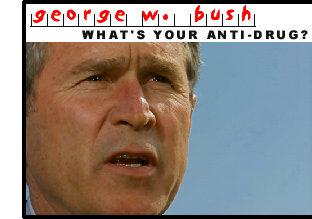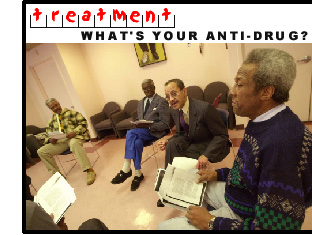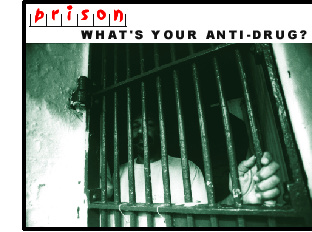
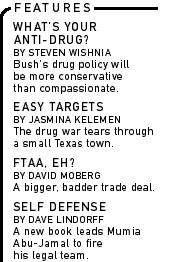
|
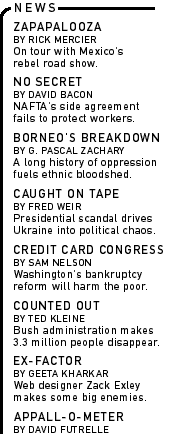
|
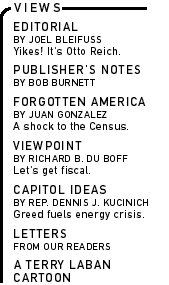
|
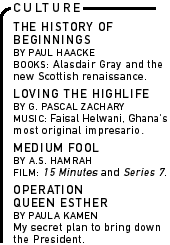
|
| |
|
|||||||
|
In his first interviews as attorney general, John Ashcroft pledged to "reinvigorate," "renew," "refresh" and "re-launch" the war on drugs, arguing that the Clinton administration had been lax in fighting narcotics. It's difficult to imagine how Bill Clinton could have been much harsher, short of public executions of drug dealers. Under his administration, federal prisons opened at a rate of almost one a month, confining a population that is now 58 percent drug offenders--almost three times the percentage in state prisons, according to figures from the Washington-based Sentencing Project. The Clinton administration also refused to fund needle-exchange programs, prosecuted medical-marijuana patients, and began to take sides in the Colombian civil war in the name of fighting cocaine. A devout prohibitionist, Ashcroft is now the top-ranking federal official dealing with
Yet, facing a diverse and growing movement to ameliorate or end prohibition, Bush's drug policy may turn out to be less fanatically hardline than his father's. "He's made some good noises in some good directions," says Jerry Epstein, president of the Drug Policy Forum of Texas. Last year, Bush suggested that medical marijuana was a states' rights issue. More recently, he has dropped hints about increasing spending for drug treatment and reducing the 100-to-1 disparity between federal sentences for crack and powder cocaine. (For his part, Ashcroft has advocated reducing the crack/coke sentencing disparity by increasing penalties for powder cocaine.) Whether Bush means it is another story. After a Bush aide met with
medical- Harrell points out that in 1999 the Bush administration named undercover cop Tom Coleman "Lawman of the Year." Coleman's accomplishment was setting up the arrests of 43 people in the small Panhandle town of Tulia on cocaine charges. Forty of the people arrested were black, and the ACLU has filed a civil rights lawsuit charging that many of them were framed--in two separate trials, Coleman testified to being in different places at the same time (see "Easy Targets," page 23). Harrell says the drug task force program that assigned Coleman to Tulia was "designed and directed" by Bush's office, and specifically targets users and small-time dealers in areas where convictions are easy to get. Texas now has more people in prison than any state. According to state figures, its 107
highest rate in the nation after Louisiana. One-fifth of them were imprisoned on drug charges. Between 1988 and 1998, according to the Drug Policy Forum of Texas, the state opened 77 new prisons--but just one new state university campus. "Nothing that he did as governor indicated a willingness to move away from prohibition," Epstein says. However, unlike his father, who reigned at the height of the '80s crack scare (and also looked the other way at the Nicaraguan contras' fundraising deliveries from Colombia to California), George W. Bush faces a growing anti-drug war movement that includes significant numbers of conservatives. The orthodoxy of prohibition--that illegal drugs breed violence and depravity and must be stamped out by any means necessary--is being challenged on numerous fronts. Nine states and the District of Columbia have passed laws legalizing medical marijuana, despite a 1970 federal law that declares marijuana to have "no accepted medical use." One strain in what is awkwardly called the "drug-law-reform movement" focuses on "harm reduction" policies such as needle exchange. It is more realistic to expect addicts to take small steps toward self-preservation than one giant leap to abstinence, the argument goes, and it's better for them to shoot two bags of heroin with a clean needle than to shoot 10 bags with a virus-infested set of "gimmicks." Another strain, more libertarian and marijuana-oriented, asserts that the government has no right to jail people for private behavior comparable to drinking or home-brewing. Others question the length and inflexibility of drug sentences, the numbers of people in prison, and the racial disparities among those behind bars. New Mexico Gov. Gary Johnson, a Republican with libertarian sensibilities, advocates legalizing marijuana. While he believes that employers have the right to drug-test workers, and personally opposes drug use, Johnson is one of the few politicians who doesn't say he "experimented" with marijuana. "I smoked it," he emphasizes. Another Republican, New York Gov. George Pataki, has proposed some easing of the state's draconian "Rockefeller laws," which mandate 15 years to life for possession of four ounces of heroin or cocaine, regardless of the defendant's role in the deal. And with three-fourths of the nation's drug prisoners being black or Latino (that figure is more than 90 percent in New York, Maryland and Illinois), African-Americans, whose neighborhoods bore the worst of the crack-trade wars, are increasingly weary of seeing multitudes of their young men locked up. Black-community pressure got President Clinton to free Kemba Smith, who served six years of a 24-year sentence essentially for being a crack wholesaler's ex-girlfriend. "I don't think the law was intentionally designed to oppress one group of people over another. But in its implementation, it certainly has had a disproportionate effect on people of color," former Baltimore Mayor Kurt Schmoke told High Times last year. Some of this dissent may reach into the Bush administration. Epstein speculates that
"I'm more hopeful than I expected to be," says Kevin Zeese of Common Sense for Drug Policy. He sees possible movement in five areas: increased treatment, easing mandatory minimum sentences, reducing racial profiling, eliminating the crack/cocaine sentencing disparity, and maybe legalizing needle exchanges. Ashcroft is an ardent foe of needle-exchange programs, Zeese notes, but Health and Human Services Secretary Tommy Thompson funded them while he was governor of Wisconsin. Drug courts, in which defendants are sentenced to mandatory treatment instead of jail, would fit the "compassionate conservative" model perfectly. They are the centerpiece of Pataki's proposal in New York, which he released in January. It would allow judges to send some people charged with possession of cocaine or heroin to a court-run rehabilitation program, with probation if they complete it, and prison if they don't. However, most of the state's drug prisoners are low-level dealers with prior felony convictions and would not be eligible. (Democratic legislators have introduced a counterproposal that includes them.) But compulsory treatment brings up several caveats. First, there's little funding for voluntary treatment, so focusing resources on compulsory treatment means that poorer addicts would have to to be arrested before they could get help. Second, if it is crossed with Bush's plans to turn social services over to "faith-based" groups, the result could be forcing drug users into programs telling them the only way to conquer their addiction is to accept Jesus Christ as their personal savior. Third, treatment costs money. Bush has promised to add $1 billion in federal funding, a small fraction of the amount spent on drug enforcement. It is generally estimated that about 30 percent of total government drug spending goes to treatment and education. President Clinton vowed to increase that proportion, St. Pierre recalls, but never did. Whatever hopes people have about Bush, they do appear to contain at least some wishful thinking, largely stemming from the "Nixon going to China" theory: that it will take a Republican to end the war on drugs, someone free of any hippie-liberal "soft on crime" stigma. Gary Johnson might fit that bill, but it is extremely difficult to imagine George W. Bush legalizing marijuana. For one, a significant part of his political base comes from the culture warriors of the
Bush also has to face a potential quagmire in Colombia. While U.S. intervention there clearly fails the "Powell Doctrine" tests of a clear objective and an easy victory, Bush seems unlikely to abandon a military mission in progress, especially one supposedly against the twin demons of drug cartels and leftist guerrillas. (Plan Colombia conveniently ignores the right-wing paramilitaries' involvement in the drug trade.) Bush's delay in picking a drug czar could be a sign that he wants to avoid drug issues as much as possible. It is hard to argue that prohibition is not an awful flop. It can't stop what it's meant to stop: The nation's prison and jail population has quadrupled since Ronald Reagan took office 20 years ago, but cocaine and heroin prices have plummeted. Most Americans under 55 have either smoked marijuana themselves or know people who have, yet pot busts now average 700,000 a year, with 70,000 in New York City alone last year. And the excesses of the war on drugs, from search-and-seizure abuses to the racial disparities in who goes to prison, are increasingly obvious. On issues such as racial profiling, Epstein says, "They have to do damage control. They can't avoid addressing it." But does Bush have the desire to make significant changes, or the courage to face the furious opposition that would come if he did? If you can't arrest your way out of the problem, but don't want to consider legalization, what do you do? "He couldn't even tell his kids that he'd been arrested for drunk
driving," notes NORML's St. Pierre. "Considering his inability to
talk about drugs during the campaign, and his evasiveness about
his own drug use, I hope lack of communication doesn't become national
policy." Steven Wishnia is a senior editor at High Times and the author of Exit 25 Utopia (The Imaginary Press). Read Jasmina Kelemen's article, "Easy Targets."
|


